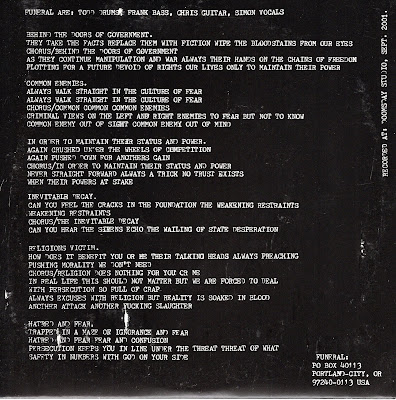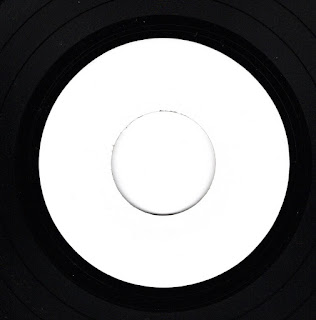And while we're at it, let's stick in Portland for a bit longer then. I have never been there but the name of this town sounds so familiar that it feels like it is located, not unlike the final bloodbath, just around the corner. It is definitely not, though, and while I am quite conversant with punk music from Portland and have proven myself in hard-fought argumentative battles over the worth of Tragedy (a fairly common initiation ritual for young punks in the early 00's), I am literally clueless about the town of Portland itself. To me, it is synonymous with quality punk-rock that still tends to be overhyped, and therefore I have trouble imagining that actual persons that are not even punks also live there. The idea that someone could live in Portland and yet be unaware of the existence of Hellshock is something of a nonsensical aberration. I mean, what's the point of living there then? It cannot be just for the shit weather, right?
The early noughties were a prolific time for the Portland hardcore punk scene and was home to some of the most wanted - or so they seemed judging from the hyperbolic qualifiers that often preceded them - bands around at the time. Bands like Remains of the Day, Tragedy, Atrocious Madness, Hellshock or Blood Spit Nights made a lasting impression on many young crusty punks like myself as they sounded both new and modern and yet grounded in the classic stuff (that was how I saw it then anyway). And that's without even mentioning studs'n'spikes-free bands like The Observers or The Exploding Hearts that were also active although then, though to be fair, they were extremely unappealing to me with their checkered shirts and their sensitive tunes. I craved to be beaten hard with relentless and tasteful hardcore punk that made me feel cool and Portland provided exactly that. I was aware that this geographical location gave bands an edge, if not a prestige, and there was certainly an element of trend to it as they were usually talked about and promoted in positive terms, sought-after and visible. Let's face it, not all those early 00's PDX bands were amazing, some were just decent small local bands, and I now realize how important and foundational the 90's were to the development of the aforementioned bands, but of course, when you're younger, you just have to feel that you are living in an exceptional time, in a good or bad way, otherwise it all becomes a bit pointless and you become aware of the repetitive circularity that make up our cultural practice and you do not really want to think about that when you are 20.
Funeral was one of many PDX bands active in the early 00's and I have had this Ep since it came out. Truth be told, it never was a favourite of mine, especially compared to other heavier and tighter PDX formations around then or to the so-called stenchcore revival bands that were about to rise. Still, Cry of State Desperation is an Ep I have always enjoyed listening to and that I have grown to appreciate more and more. I suppose you could compare Funeral to another band that got invited to Terminal Sound Nuisance in The PDX-Files, Final Massakre. Like Funeral, Final Massakre was a referential hardcore d-beat side-project that was not meant to become "the main band" but that presumably everyone enjoyed doing because it was fun to play this kind of music with mates. And because Portland appears to be a small place with overactive punx, there is one member in common between Final Massakre and Funeral, namely Frank (then also yelling in a microphone in the great Atrocious Madness, and later on the distorted 6-strings in Lebenden Toten), playing the bass. On vocals, you can find Simon (from Bacteria - that also comprised members of Remains of the Day and Warcry - and Bombs Away - with Harum-Scarum and Fall of the Bastards members), on the guitar you had Chris (from Yankee Wuss - with members of Harum-Scarum and Atrocious Madness - and Midnight - with members of Hellshock, From Ashes Rise and Harum-Scarum) and finally, on the stool, the D was passionately beaten by Todd (then in Tragedy, Severed Head of State and Call the Police, and drum-wise responsible for the dynamics in Deathreat and Trauma). That was already an intense session of name-dropping (that could earn you some decent punk points in 2003) and something that was very typical of the PDX scene. Every punk in town played in three bands so that, from the outside, judging from the number of bands, you had the impression that there were massive amounts of dedicated punks while the truth was far less epic. But then I guess most DIY punk scenes work this way.
As you can see, Funeral was a band made up of busy bees and Cry of State Desperation was their first recording although it came out in 2003, after the 16 Song Ep that was recorded after (2002 I guess). I think I read somewhere that Cry of State Desperation was actually a demo recording that got to be pressed onto vinyl (a problematically common occurrence in 2019 but no so much then) and considering the absence of production and the raw rehearsal sound, it sounds like a very plausible origin story. The six songs that make up the Ep were recorded in September, 2001, although it does not say if it was before or after the eleventh, an event that along with its aftermath (the imperialistic oil policy and the wars of George W. Bush) certainly redefined, directly or indirectly, what American punk-rock was going to be about in that decade. This said, the songwriting would not have been affected too much if it were recorded on the 12th instead of the 10th and it would still have qualified as d-beat with a genuine raw punk vibe. I suppose the following years have crowned Warcry as the iconic PDX d-beat band, a title they do deserve as I cannot think of a better "just like Discharge" hardcore band in the 00's, thus overshadowing more humble bands like Funeral in the process. However it would be far-fetched to claim that Funeral (brilliant name for a punk band by the way) were going for the much-coveted "just like Discharge" throne. If there is a definite Fight Back and Decontrol influence that acts as a general structure, I can distinctly hear Discharge-influenced bands from the 80's as well. Peacepunk hardcore bands like Iconoclast, Diatribe or Against do immediately spring to mind, as do UK bands like early Antisect, Anti-System and Varukers or Europeans like EU's Arse or early Cimex. Funeral sound both like a contemporary of those 80's hardcore greats trying to get closer to Discharge and like learned punks doing their best to sound like they were an 80's hardcore band in love with Discharge. Undeniably, much of this strong 80's vibe derives from the very raw sound of the recording that confers a proper old-school hardcore aggression to the songs. Although I think that Funeral really recorded these six songs quickly and urgently, in a couple of takes if not in only one, with no overdubs, firstly to keep it raw, real and closer to the raw punk sound of their 80's inspirations, and secondly, because the members were all so busy with other bands that these few hours were all they could dedicate to Funeral at the time but seeing that they were all experienced musicians, the result was still pretty solid, energetic and intense instead of sounding like a sloppy mess.
If you like your d-beat with a strong raw hardcore punk flavour, Funeral will be your thing. It has a great spontaneous and direct hardcore punk energy that shows that d-beat does not necessarily have to sound like a nuclear explosion. I would not go as far as stating that Funeral demonstrates that d-beat can be diverse (as it should not be! Who wants to listen to "blackened d-beat"? Exactly, no one does) but it shows that you can have several shades of D. Contrary to many modern bands claiming to be "raw" when they just use too much distortion or to boringly overproduced metallic d-beat bands, Funeral's songs were actually raw and punky and pogoable, as if taken from an old tape. Like with many PDX bands, you have two levels of appreciation. You can enjoy Cry of State Desperation for what it is primarily, a lovely slice of fast, riff-driven hardcore punk, and you can try to spot the Discharge Easter eggs and other hardcore references that they threw in the mix. The 2002 12'' Ep is not quite as raw and maybe a little too long given the genre's template, but it still comes recommended if you are like it raw and unpolished.




Awesome report about french punk scene in the d.i.y. magazine.
ReplyDeleteThanks..im discovering awesome stuff.... Cheers from Netherlands!